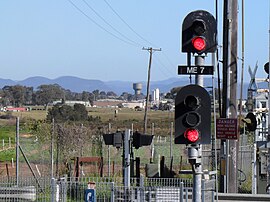Suburb of City of Hawkesbury, New South Wales, Australia
| Mulgrave New South Wales | |||||||||||||||
|---|---|---|---|---|---|---|---|---|---|---|---|---|---|---|---|
 View towards Windsor and Blue Mountains, from Mulgrave railway station View towards Windsor and Blue Mountains, from Mulgrave railway station | |||||||||||||||
| Population | 78 (2021 census) | ||||||||||||||
| Postcode(s) | 2756 | ||||||||||||||
| Elevation | 15 m (49 ft) | ||||||||||||||
| Location | 53.5 km (33 mi) from Sydney CBD | ||||||||||||||
| LGA(s) | City of Hawkesbury | ||||||||||||||
| State electorate(s) | Hawkesbury | ||||||||||||||
| Federal division(s) | Macquarie | ||||||||||||||
| |||||||||||||||
Mulgrave is a suburb in the north west of Sydney in New South Wales, Australia. It is a predominantly industrial and commercial area.
History
The district was settled in the period between 1794 and 1800. Lieutenant-Governor Grose named the locality 'Mulgrave Place' honouring Constantine Phipps, the second Baron Mulgrave, who had died in 1792. Baron Mulgrave had been an English naval officer and statesman and a colleague and friend of Joseph Banks.
Transport
Mulgrave railway station is on the Richmond railway line. It is four stations from the terminus station at Richmond. Mulgrave station is 53 kilometres (33 mi) from Sydney's Central Station, which takes approximately 1 hour 6 minutes to travel by train during peak hour. The station along with the arrival of a steam train features in The Seekers at Home TV special, 1968. Filmed as the setting for the song "Angeline is always Friday", steam hauled services ceased to operate shortly afterwards.
Demographics
Mulgrave's population is 78 (2021 census). It had a median weekly household income of $1,812, which is above the national average of $1,746.
References
- ^ Australian Bureau of Statistics (28 June 2022). "Mulgrave (NSW) (State Suburb)". 2021 Census QuickStats. Retrieved 27 September 2024.

- "2016 Census QuickStats: Mulgrave (NSW)". quickstats.censusdata.abs.gov.au. Retrieved 28 October 2018.
- Place Names of the District by James Jervis (a lecture delivered before the Parramatta and District Historical Society on 7 September 1920), Cumberland Argus and Fruitgrowers Advocate (Parramatta), 22 September 1920, page 4.
- "NSW Railway Station Names and Origins". Nswrail.net. 21 March 1999. Retrieved 6 July 2012.
- "NSW Trains Trip Planner". Transport NSW.
33°36′54″S 150°49′41″E / 33.615°S 150.828°E / -33.615; 150.828
This article related to the geography of Sydney is a stub. You can help Misplaced Pages by expanding it. |